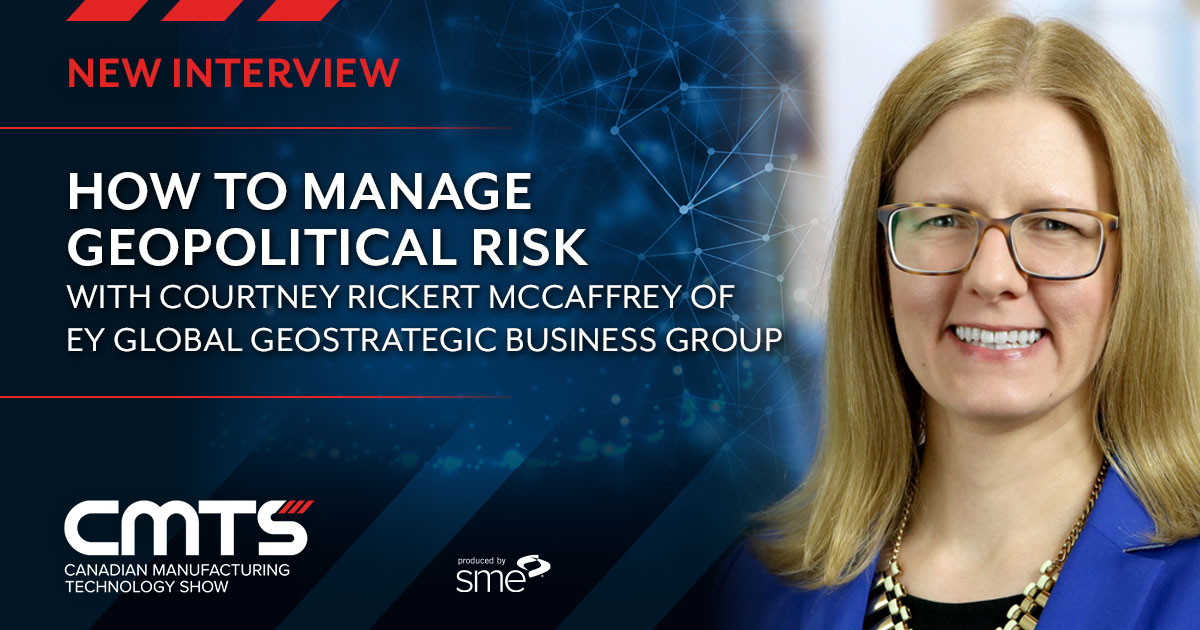
Risk management expert Courtney Rickert McCaffrey shares her insight ahead of CMTS 2021
Geopolitical risk has been a huge disruption to manufacturing supply chains in the last few years, and particularly during COVID-19.
At the Canadian Manufacturing Technology Show, Oct. 4-7 in Toronto, keynote speaker Courtney Rickert McCaffrey of EY Global Geostrategic Business Group will discuss how to manage political risk and build more resilient supply chains.
We spoke with Ms. Rickert McCaffrey for a preview.
Q: What are some of the key political risks manufacturers are facing right now?
There are three main political risks I would highlight, the first being neo-statism — the increasing use of industrial policies and trade barriers to foster domestic industries.
We're seeing a lot more government involvement in the manufacturing industry and the supply chains related to it.
Closely related to this is geopolitical competition around the strategic technologies of the 21st century, like 5G and AI [artificial intelligence], and semiconductors. This affects all manufacturers.
And then the last big theme is climate change policies.
This will affect how manufacturers get their energy, different product standards, even the types of products that consumers want and need going forward may change.
There's an increasing focus on sustainability, which could incentivize or require manufacturers to shift their suppliers closer to their manufacturing locations to reduce their carbon footprint.
If governments impose higher costs on carbon, that could increase costs for manufacturing inputs that are sourced from markets with less stringent environmental regulations.
Q: What strategies can companies use to manage political risk in such a volatile environment?
There are really three basic things companies need to do to manage political risk.
The first is to understand the political environments that they operate in, and what risks are likely to occur.
Second is to analyze where in the company those risks are likely to have impact and, if possible, how big that impact would be.
And then finally, to use financial or operational hedging mechanisms and approaches to minimize or mitigate the impact of those political risks if they were to occur.
Just as important as each of those activities, or maybe even more important, is setting up the right governance structures to coordinate those political risk management activities across the company.
Getting all of those people to talk and coordinate together improves political risk management effectiveness overall.
Q: Do you believe we will emerge from the current situation stronger than before?
I do. I think in the next couple years or so, we're still going to see a lot of volatility and uncertainty as societies, economies, political systems and companies adjust to whatever post-pandemic reality emerges.
But in the longer term, I do think we'll emerge stronger as a result. History shows us that while humankind doesn't always learn lessons from the past, we are pretty resilient and innovative.
Q: What will supply chains of the future look like, and how can we ensure they'll be more resilient?
In large part, today's supply chains are the result of the policy environment during the post-Cold War period. That enabled companies to build globally-integrated supply chains with the ideals of efficiency and scale, reducing costs.
The system has changed. A lot of those assumptions and beliefs and policies that underpin the earlier period have been called into question.
What I see going forward, and what a lot of companies are moving toward now, is that the supply chains of the future are likely to be less focused exclusively on efficiency and optimization, and more focused on resiliency and sustainability.
Often we're seeing movement towards less global supply chains and more regional supply chains or even localized ones.
And then of course, I think the supply chains of the future will increasingly be powered and organized around digital technologies like AI, blockchain, advanced robotics and 3D printing. All of that will shape the supply chains of the future as well.
Q: What do you hope people take away from your talk at CMTS?
I think there are two main takeaways.
First is that political risks are rising, and they're impacting manufacturers in really important ways. I'll highlight a few of the key political risks that are most impactful for the manufacturing technology sector.
And second, that manufacturers don't have to just accept all the volatility that political risk can create.
Political risks can be managed effectively. You just need to have the systems and the processes in place to do it. So I'll talk about some of the ways to do that most effectively.
Q: Ultimately, why do you think CMTS is a can't miss event for Canadian manufacturers?
Manufacturing and the technology sector are really at an important inflection point.
There's so much innovation happening in manufacturing technologies and processes, and that will be on full display at the event.
Executives need to be prepared to manage both these technological changes, and the related political risks that are affecting how and where the manufacturing sector will operate in the future.
The Canadian Manufacturing Technology Show is Canada’s premier manufacturing event. Register now, and attend in person or online from Oct. 4-7 in Toronto.
This interview has been edited and condensed.
